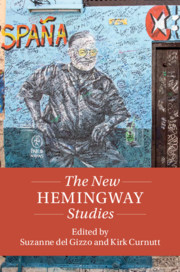Book contents
- The New Hemingway Studies
- Twenty-First-Century Critical Revisions
- The New Hemingway Studies
- Copyright page
- Contents
- Contributors
- Introduction Hemingway in the New Millennium
- Part I The Textual Hemingway
- Part II Identities
- Part III Global Engagements
- Chapter 12 “There’s No One Thing That’s True”
- Chapter 13 New World Order, Old World Ways
- Chapter 14 Post-“American” Hemingway Studies
- Chapter 15 Politics, Espionage, and Surveillance
- Conclusion
- Works Cited
- Index
Chapter 13 - New World Order, Old World Ways
Hemingway’s Colonialism and Postcolonialism
from Part III - Global Engagements
Published online by Cambridge University Press: 30 August 2020
- The New Hemingway Studies
- Twenty-First-Century Critical Revisions
- The New Hemingway Studies
- Copyright page
- Contents
- Contributors
- Introduction Hemingway in the New Millennium
- Part I The Textual Hemingway
- Part II Identities
- Part III Global Engagements
- Chapter 12 “There’s No One Thing That’s True”
- Chapter 13 New World Order, Old World Ways
- Chapter 14 Post-“American” Hemingway Studies
- Chapter 15 Politics, Espionage, and Surveillance
- Conclusion
- Works Cited
- Index
Summary
In “New World Order, Old World Ways: Hemingway’s Colonialism and Postcolonialism,” Marc K. Dudley looks specifically to how well Hemingway studies of the past twenty years has engaged the tenents of postcolonial theory, which critiques the political oppressions of imperialism, both political and cultural. As he argues, criticism has mostly focused on Hemingway’s ethics, arguing in the main that between his first African safari in 1933–1934 and his final one twenty years later he grew in his awareness of the Third World political scene, which allowed him to tentatively overcome his ethnocentrism. That space, many critics argue, can be measured in the differences between Green Hills of Africa (1935) and the posthumously published True at First Light (1999) and the full manuscript from which it was culled, Under Kilimanjaro (2005). In addition to Africa, Dudley explores Hemingway’s political awareness of Cuba, from its late-nineteenth-century fight for independence from Spain to the revolutions of both 1933 and 1939. Texts examined include To Have and Have Not (1937) and the oft-ignored story “Nobody Ever Dies” (1939).
Information
- Type
- Chapter
- Information
- The New Hemingway Studies , pp. 204 - 220Publisher: Cambridge University PressPrint publication year: 2020
